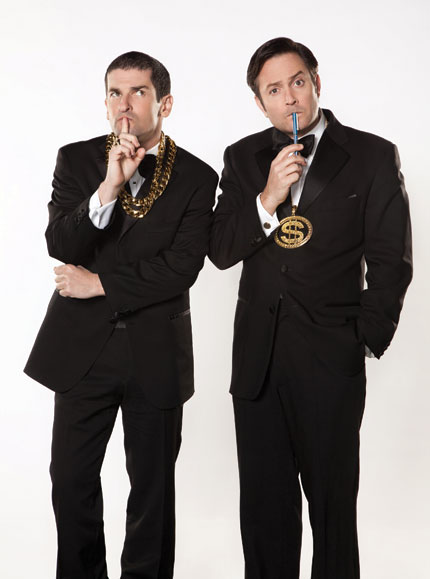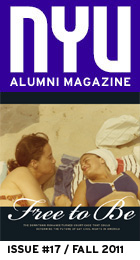comedy
Court Jesters
in the kingdom of hollywood studios, a pair of scribes writes for their lives
by Renée Alfuso / CAS ’06
Back in 1988, a group of 11 feisty underclassmen started a comedy troupe at NYU that soon transformed into the absurdist MTV series The State—a superdry, bitingly sarcastic sketch-comedy show for Generation X that gained a cult following and launched the careers of its young stars, nearly all of whom still work in show business today. Thomas Lennon (TSOA ’92) and Robert Ben Garant (TSOA nongrad alum) are two of those now-grown-up misfits, best known for creating the Comedy Central hit Reno 911! But the funnymen are also prolific screenwriters—having penned feature films together for almost every major studio over the past 10 years. So when the self-described “manic” scribes needed something to do during the 2008 writers’ strike, they turned to a new medium.
In Writing Movies for Fun and Profit: How We Made a Billion Dollars at the Box Office and
You Can, Too! (Simon & Schuster), the authors pull back the silver screen to reveal the
elation and ugliness of working in Hollywood, based on their experience with both blockbusters
(Night at the Museum) and flops (Taxi). With its combination of brutal honesty and sage
advice, the book has been praised by Library Journal as “the first screenwriting manual
that is as entertaining as it is informative.” (Plus, some proceeds from the book will
be contributed to the USO.) Tales of executives falling asleep in meetings and omnipotent
movie stars are coupled with practical advice on script formatting, pitching ideas,
and the messy process of arbitration.
NYU Alumni Magazine sat down with Lennon and Garant to discuss their journey from vulnerable freshmen beaten up by muggers to adults beaten down by the studio system.
Why write a book like this?
Ben: We just thought that most screenwriting books are theory written by professors, but there’s
the other like 90 percent of screenwriting that’s the business and how you sell your idea.
Tom: You need to cross-reference those books’ authors and the movies that they’ve written
because the answer is almost none. If they know so much about how to sell a screenplay, I
assure you from having written a book that they would not be writing books about it, they
would be writing movies.
Writing for the studios means having to
compromise your vision.
Is that tough?
Tom: We always compare ourselves to [court composer Antonio] Salieri. We’re like the Salieris
that never met a Mozart. So we’re not tortured; we’re happy Salieris.
Ben: As soon as you understand what the job is, it’s the greatest job in the world. We’ve been
around long enough to work with talented people who are a pleasure, and also with untalented
people where it’s a nightmare that crushes your soul. But you keep going. That’s the system.
Tom: You just have to get over things very quickly, because you’re going to get fired over and
over again. You’re going to watch people throw away things that you’ve slaved over writing, on
a total whim, because the actor refuses to wear a hat.
In the book, you
say that it’s
important to be
flexible like a reed.
Ben: Exactly. So many people with books on screenwriting talk about it like you’re this precious
little Oscar Wilde staring out the window and waiting for a muse—but it’s more like ultimate
fighting. You roll with the punches because, man, you’re going to get punched.
Tom: Maybe living in the Village in the ’80s was just good practice because we got mugged so
much. Wearing a bright yellow bow tie my second week in New York was probably the reason I got
beaten nearly to death across the street from [NYU’s] Brittany Hall. Almost murdered—week No.
2. When we came to New York, it was right after the Tompkins Square Park riots and the Village
was so dangerous, we would not go to Avenue A after dark under any circumstances, and Avenue B,
never.
Ben: Yeah, it was like Somalia, but now it’s cute. There’s like cupcakes, Hello Kitty stores,
and ironic T-shirts all over the place.
Tom: Now it’s adorable and we can’t afford to move back.
What do you remember about performing on
campus as students?
Tom: Our first paying gig was opening for Dennis Miller at the Loeb Student Center.
Ben: We got paid like $1,000 split 11 ways and then they asked us if we wanted to eat and
everybody ordered so much Chinese food that it ended up costing more than they had just paid us,
and they were so angry.
Screenwriters Lennon (right) and Garant demonstrate “the art of nodding” while taking notes from studio executives.







